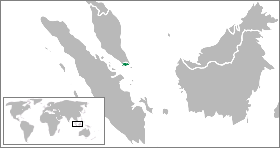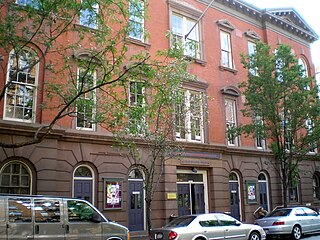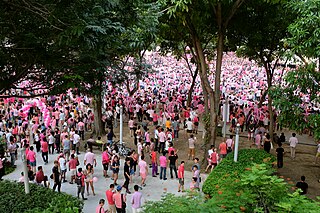The Queer Youth Network (QYN) was a national non-profit-making organisation that was run by and for lesbian, gay, bisexual and transgender (LGBTQ) young people and is based in the United Kingdom. It had an aim to represent the needs and views of younger LGBT people by campaigning for greater visibility and equal rights, as well as providing general support and information to those who are just coming out or who are experiencing homophobia.

LGBTQ culture is a culture shared by lesbian, gay, bisexual, transgender, and queer individuals. It is sometimes referred to as queer culture, while the term gay culture may be used to mean either "LGBT culture" or homosexual culture specifically.
There are no statistics on how many LGBT people there are in Singapore or what percentage of the population they constitute. While homosexuality is legal in the country, the country is largely conservative.

There is a long history of lesbian, gay, bisexual, and transgender activity in Singapore. Male homosexuality was outlawed under British rule, despite being acknowledged among the local population. Following Japanese occupation during World War II and the country gaining independence, homosexuality and transvestism were visible as a street scene, and from the 1970s were catered for in some nightclubs. In that decade also, Singapore became a centre of gender-reassignment surgery.
The origin of the LGBT student movement can be linked to other activist movements from the mid-20th century in the United States. The Civil Rights Movement and Second-wave feminist movement were working towards equal rights for other minority groups in the United States. Though the student movement began a few years before the Stonewall riots, the riots helped to spur the student movement to take more action in the US. Despite this, the overall view of these gay liberation student organizations received minimal attention from contemporary LGBT historians. This oversight stems from the idea that the organizations were founded with haste as a result of the riots. Others historians argue that this group gives too much credit to groups that disagree with some of the basic principles of activist LGBT organizations.
COLAGE is an organization created in 1990 by the children of several lesbian and gay parents and guardians who felt a need for support.

The rights of lesbian, gay, bisexual, and transgender (LGBT) people in Singapore have evolved over the decades. Same-sex sexual activity is legal for both males and females; for men it was officially legalised in 2022 after being de facto decriminalised since 2007, and for women it was always legal. Prior to 2022, same-sex sexual activity between males was de jure illegal under the British colonial-era Section 377A of the Penal Code. The law had been de facto unenforced for decades. In February 2022, the Court of Appeal in the Supreme Court reaffirmed that 377A cannot be used to prosecute men for having sex with other men, and that it is "unenforceable in its entirety". Transgender rights in the country are also progressive in the region, which included Singapore being the first country in Asia to legalise sex reassignment surgery in 1973.
LGBT History Month is an annual month-long observance of lesbian, gay, bisexual and transgender history, and the history of the gay rights and related civil rights movements. It was founded in 1994 by Missouri high-school history teacher Rodney Wilson. LGBT History Month provides role models, builds community, and represents a civil rights statement about the contributions of the LGBTQ+ community. As of 2022, LGBT History Month is a month-long celebration that is specific to Australia, Canada, Cuba, Finland, Germany, Hungary, Italy, the United Kingdom and the United States.

The Lesbian, Gay, Bisexual & Transgender Community Center, commonly called The Center, is a nonprofit organization serving the lesbian, gay, bisexual and transgender (LGBTQ) population of New York City and nearby communities.
TREVVY was an LGBTQ website in Singapore. Started August 2006 through a re-branding exercise of Singapore's first gay portal, Trevvy ceased operation in 2021. At one point, Trevvy had over 120,000 registered users.

Amsterdam Pride, Amsterdam Gay Pride or Pride Amsterdam is a citywide queer-festival held annually at the center of Amsterdam during the first weekend of August. The festival attracts several hundred-thousand visitors each year and is one of the largest publicly held annual events in the Netherlands.

Pink money describes the purchasing power of the LGBT community, often especially with respect to political donations. With the rise of the LGBT rights movement, pink money has gone from being a fringe or marginalized market to a thriving industry in many parts of the Western world such as the United States and United Kingdom. Many businesses now specifically cater to gay customers, including nightclubs, shops, restaurants, and even taxicabs; the demand for these services stems from common discrimination by traditional businesses.

Pink Dot SG, known endonymously as Pink Dot, is a pride event that has occurred annually since 2009 in support of the LGBTQ community in Singapore. Attendees of Pink Dot events gather to form a "pink dot" to show support for inclusiveness, diversity and the freedom to love in the country. Pink Dot events typically include concert performances and booths sponsored by organizations that support the LGBT community and cause in addition to the event's name-brand formation.

Young Out Here (YOH) is a gay, lesbian, bisexual and queer youth community group based in Singapore. The community group is the first and longest running non-profit volunteer group of its kind in Singapore.

Kind Space is an LGBT community centre located in Ottawa, Ontario, Canada. They are the oldest registered LGBT-specific charity in Canada, becoming registered in 1984. The organization serves gay, lesbian, bisexual, transgender, Two-Spirit, non-binary, queer, questioning, intersex, asexual, QTBIPoC, of all ages within the National Capital Region. They provide a number of services including support groups, education, research, advocacy and community space.

India has a long and ancient tradition of culture associated with the LGBTQ community, with many aspects that differ markedly from modern liberal western culture.
Despite the history of colonisation and the resulting process of Westernisation since 1842, Hong Kong still embodies many aspects of Chinese traditional values towards sexuality. It is traditionally believed that heterosexuality is the nature, coherent, and privileged sexuality. Popular media marginalises and discriminates against LGBT members of Hong Kong in an attempt to maintain "traditional lifestyles".

Dear Straight People is an LGBT media platform based in Singapore. Since its launch, Dear Straight People has gained prominence as one of Asia's leading LGBT publications.










